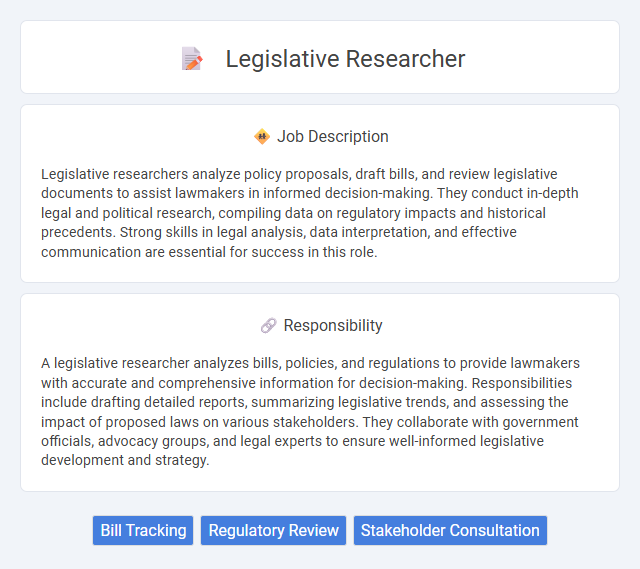
Legislative researchers analyze policy proposals, draft bills, and review legislative documents to assist lawmakers in informed decision-making. They conduct in-depth legal and political research, compiling data on regulatory impacts and historical precedents. Strong skills in legal analysis, data interpretation, and effective communication are essential for success in this role.
Individuals with strong analytical skills and a keen interest in public policy are likely to find a legislative researcher role suitable. Those who enjoy detailed research, critical thinking, and interpreting complex legal documents may thrive under the job's demands. However, people who prefer less structured environments or dislike extensive reading and data analysis might struggle with the role's requirements.
Qualification
Legislative researchers must possess a strong academic background in political science, law, or public administration, often holding at least a bachelor's degree, with many roles requiring a master's for advanced analysis. Expertise in legislative processes, policy analysis, and proficient research methodologies, including qualitative and quantitative data evaluation, are essential qualifications. Strong communication skills and the ability to synthesize complex information into clear, actionable reports further enhance a candidate's suitability for this role.
Responsibility
A legislative researcher analyzes bills, policies, and regulations to provide lawmakers with accurate and comprehensive information for decision-making. Responsibilities include drafting detailed reports, summarizing legislative trends, and assessing the impact of proposed laws on various stakeholders. They collaborate with government officials, advocacy groups, and legal experts to ensure well-informed legislative development and strategy.
Benefit
A legislative researcher likely benefits from gaining in-depth knowledge of policy development and legislative processes, enhancing their expertise in political analysis. This role may provide opportunities for career advancement within government or think tanks due to the specialized skills acquired. Participants in this field often experience satisfaction from influencing public policy and contributing to informed decision-making.
Challenge
A legislative researcher likely faces the challenge of navigating constantly evolving laws and policies, requiring a deep and up-to-date understanding of complex legal frameworks. The role probably demands strong analytical skills to interpret diverse sources of information quickly and accurately under tight deadlines. Balancing multiple priorities and managing conflicting data could also pose significant difficulties in producing clear, actionable legislative insights.
Career Advancement
Legislative researchers gain critical expertise in policy analysis, legal frameworks, and government procedures, positioning them for advancement into senior advisory roles or policy director positions. Mastery in data interpretation and stakeholder communication enhances opportunities to lead legislative initiatives or secure influential roles within governmental agencies. Continuous professional development and networking within political and legal circles accelerate career growth and access to high-impact decision-making positions.
Key Terms
Bill Tracking
Legislative researchers specializing in bill tracking monitor and analyze proposed legislation to assess its impact and progress within government bodies. They utilize databases and legislative management systems to update stakeholders on bill statuses, amendments, and voting outcomes. Proficiency in legal terminology and policy analysis enhances their ability to provide accurate, timely insights critical for informed decision-making.
Regulatory Review
Legislative researchers specializing in regulatory review analyze proposed laws, regulations, and compliance requirements to assess legal implications and policy impacts. They conduct detailed evaluations of regulatory frameworks to ensure alignment with current statutes, identify inconsistencies, and support legislative drafting processes. Expertise in government procedures, statutory interpretation, and stakeholder consultation is essential for effective regulatory oversight and informed decision-making.
Stakeholder Consultation
Legislative researchers play a crucial role in stakeholder consultation by gathering insights and feedback from diverse groups, including policymakers, advocacy organizations, and community leaders. They analyze stakeholder perspectives to ensure that legislative proposals reflect broad-based support and address key concerns effectively. This process enhances the relevance and impact of policy recommendations through data-driven engagement strategies.
 kuljobs.com
kuljobs.com